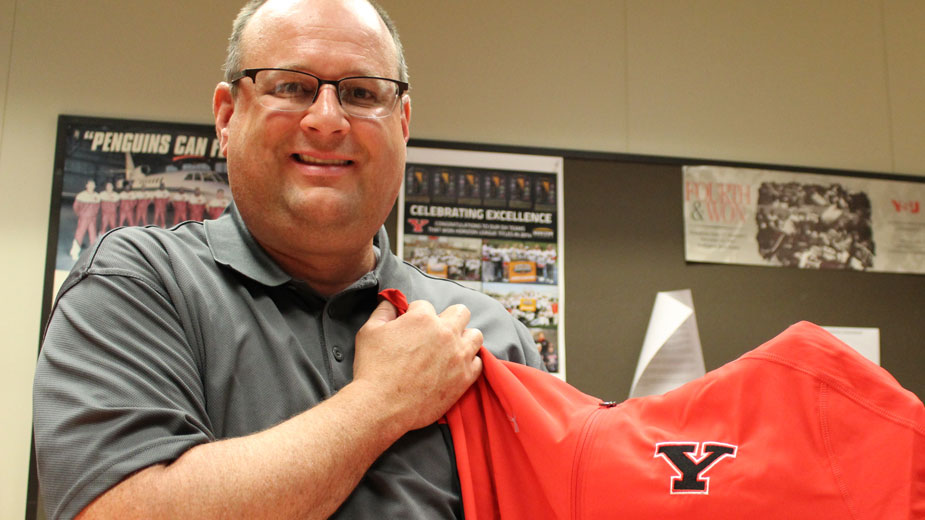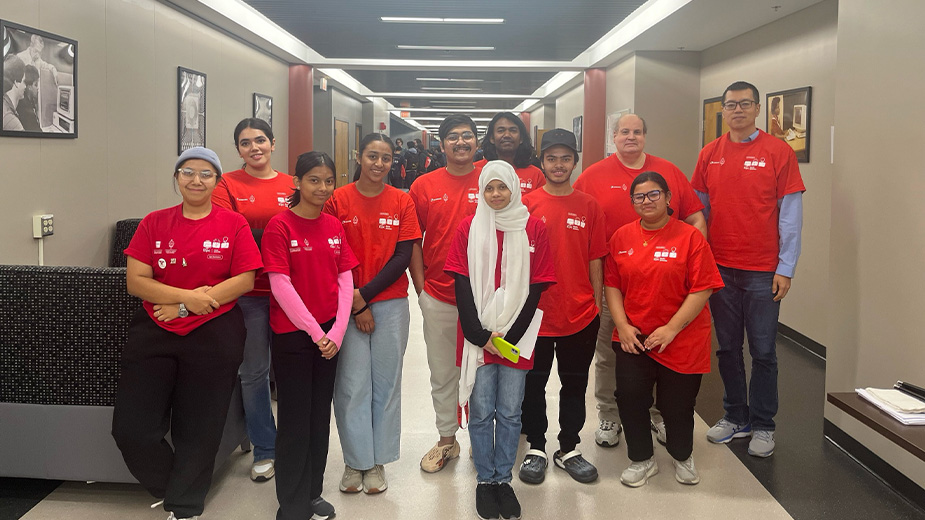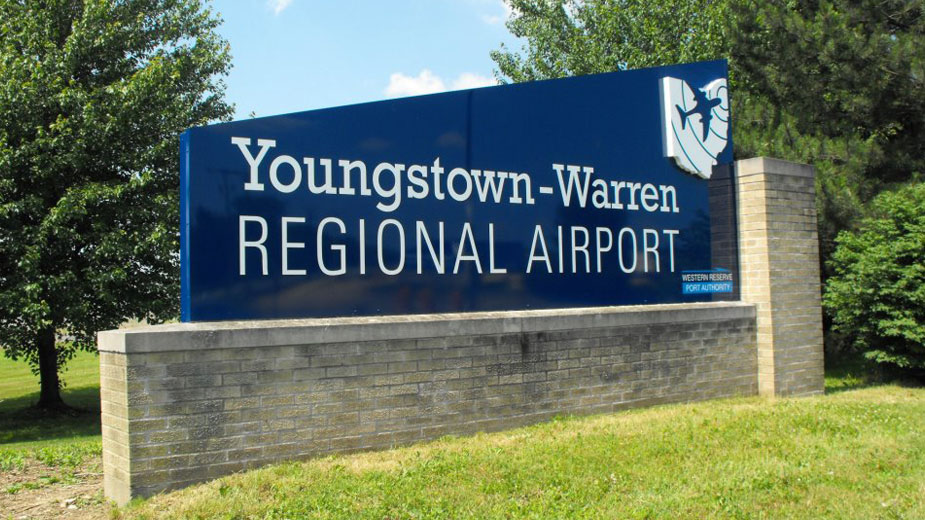Thanks to Licensing, Stambaugh Turns Red
YOUNGSTOWN, Ohio — Look into the stands at Stambaugh Stadium on Saturday afternoons during autumn and you’ll see a sea of red. Oh, you’ll spot a few flecks of white and black – more colors when it rains and fans break out their jackets and ponchos – but it’s mostly red.
“For the longest time, people would come to events and wear Ohio State clothes. You’d walk the tailgate lots 10 years ago and it was dominated by Ohio State hats and shirts and jackets,” says Robb Schmidt, Youngstown State University assistant director of athletic marketing and promotions. “Some people just figured, ‘It’s red. I’m wearing it.’ They don’t care about the logo but they know YSU is red.”
But with the number of licensed products rising the last decade – most notably apparel, although the list includes everything from bar chairs to pens to bobbleheads – the number of items bearing Pete the Penguin or the block Y featured on football helmets is climbing.
Retailers such as J.C. Penney and Walmart have stepped in and started selling Youngstown State gear, in addition to local merchants such as Eagle Wear in Hubbard and Trolio’s T-Shirts in Poland. Later this year, Columbus-based Homage will begin carrying YSU shirts for the first time and Victoria’s Secret will offer YSU clothes as part of its Pink brand.
“You want people wearing YSU stuff around town. You want a Y sticker on the back of every car. It’s great to be an Ohio State fan, but this is our town and our team. We want you to try and support the team and university,” says the director of intercollegiate athletics, Ron Strollo. “To walk around the Canfield Fair and finally see more Youngstown State shirts than Ohio State shirts is important to us. No doubt about it.”
Local merchants take pride in offering apparel carrying the university’s logos. Sherry Trolio DiVito, owner of Trolio’s in Poland, has been licensed since it became required in the mid-1990s and has sold YSU apparel since the early ‘80s. She estimates about a quarter of her sales come from Penguins merchandise.
“They’re the only college I have a license for, so it’s the only one I carry because they’re right here. I don’t need anyone else,” she says. “You want your local colleges and teams to get a portion. When you see people buy shirts at a flea market or someplace like that, those shirts aren’t licensed and don’t support the team.”
To deter counterfeiters, Schmidt notes, Indianapolis-based Learfield Licensing Group – which acts as the licensing department for YSU and scores of schools nationwide – sends representatives to area stores to learn what merchandise is sold and whether the manufacturer has a license.
In the first quarter of this year, licensed products generated about $9,000 for the athletics department. The fourth quarter, Schmidt adds, usually brings the largest royalty check, thanks to holiday shopping. Last year, YSU received about $42,000 in royalties from licensing its logos.
For every product sold that bears Pete the Penguin, the block Y, official wordmarks and the university seal, YSU gets 10% of the price. The money is used to fund scholarships.
The process for licensing is fairly straightforward. Companies must complete an application with information about their businesses, if they’ve received a license before, their distribution strategies, how the license will be used and proposed designs for the products. An application fee is also required.
Learfield reviews each application before forwarding it to the athletics offices at Youngstown State, which has the last say on approval or denial.
“You can’t alter any logo. If you want Pete in a nurse’s outfit or holding a golf club, you cannot do that,’ Schmidt says. “There are ways to get around it to personalize him a little bit, but you can’t change the logos.”
Among the designs he’s been forced to reject are variations of Pete wearing a top hat and inside a space ship. Another common reason for rejection is use of the old Pete the Penguin logo, slightly different from the current Pete, using what Schmidt refers to as the “tree Y” instead of the current block Y and an altered fold of his scarf.
With more and more companies seeking to use YSU logos, the university is designing more logos for merchandisers to use. On Schmidt’s table are a variant of Pete with a red scarf instead of a white one and a new “interlocking YSU,” a wordmark based on the block Y.
“It gets difficult because so many people want to use the logo. We’ve worked with Learfield to expand the portfolio,” Schmidt says.
Schmidt and Strollo agree that the volume of apparel sold is strongly connected to two things: sports success and enrollment. If the basketball or football teams do well, the number of license applications surges.
“And if you have 14,000 students enrolled, then there are 14,000 students who want Youngstown State apparel,” Schmidt states.
For the university, Strollo adds, selling YSU apparel is about more than money.
“It’s about branding. It’s important for people to be wearing YSU stuff around town and seeing the block Y on every shirt is our goal,” he says.
Copyright 2024 The Business Journal, Youngstown, Ohio.



